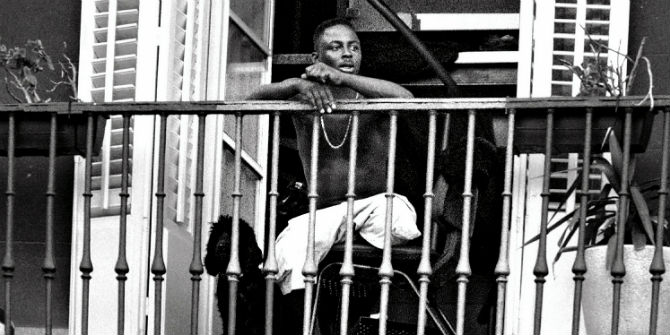
 Brexit came as a shock to many Britons living in the EU27, but for many People of Colour, it confirmed their fears about the nature of British society and their experience of racism. Michaela Benson and Chantelle Lewis (Goldsmiths, University of London) argue that white Britons in the EU, suddenly confronted by the possible loss of their citizenship rights, have not realised the connection between Brexit and continuing fights for migrants’ rights.
Brexit came as a shock to many Britons living in the EU27, but for many People of Colour, it confirmed their fears about the nature of British society and their experience of racism. Michaela Benson and Chantelle Lewis (Goldsmiths, University of London) argue that white Britons in the EU, suddenly confronted by the possible loss of their citizenship rights, have not realised the connection between Brexit and continuing fights for migrants’ rights.
On 29 March 2019, the European Parliament adopted a resolution on the fundamental rights of people of African descent in the European Union. This responded to evidence reporting the prevalence of racism and discrimination faced by Black people living in Europe, and was a small step towards tackling racial inequality, disadvantage and discrimination in EU institutions and member states. And yet, amid Britain’s preoccupation with Brexit, this news seems to have been passed over. For us, this resolution confirmed the findings of research we have been conducting with British People of Colour living and working in the EU27.

It is striking that the media coverage of the post-Brexit fate of British citizens living in the EU27 rarely considers the diversity of this population. The way in which the British in the EU are commonly understood by the public, the media, and by Parliament perpetuates ideas of a predominantly white, middle-class and ageing population of Britons living overseas. But why would British citizens overseas be any less diverse than the British population as a whole?
As we highlight in this recently published paper, this perspective brings into view how racial inequality and discrimination are a problem at the heart of Europe (you can also hear us discuss this in a recent podcast). Several recent high-profile incidents involving British People of Colour illustrate the racialised boundaries of belonging in Europe: Magid Magid MEP’s experience of being questioned for his right to enter the European Parliament on his first day in office, model Naomi Campbell’s experience of being refused entry to an event held in a hotel in the south of France on the basis of the colour of her skin. And as Nadine White reports for the Huffington Post, black Britons travelling in Europe routinely encounter racism and hostility.
While Britain may be exceptional in having voted to leave the EU (and in following through on it), the structural and systemic racism that has been made so abundantly visible in recent years is as pronounced – if not more so – in other European Member States as it is in Britain.
Many people woke up to the extent of racism in Britain through Brexit. Across our research, this is a narrative prominent in how British citizens living in the EU27 make sense of Brexit: Brexit was a shock that brought home to them, most likely for the first time, that racism was alive and well in the heart of British society. For those who support Britain remaining in the EU, the narrative casting the outcome of the referendum as signalling racism and xenophobia in Britain, is mobilised as evidence of ‘bad Britain’. This is a country they are happy to have left behind and to which they have little desire to return.
As Akwugo Emejulu describes, shock and outrage at the outcome of the referendum is tantamount to ‘white innocence’ casting racism as an aberration linked to the Brexit vote. This conveniently glosses over the long histories through which racism and xenophobia progress; it ignores the persistence of racial exclusion – structurally, institutionally and in the everyday – in questions of who counts as British (and European). It persists in how many newly-politicised Britons in the EU27 make sense of the imminent loss of their rights through Brexit; as Bel Parnell-Berry stresses, this narrative fails to draw out the connection between their fate through Brexit and longer histories of citizenship deprivation and fights for migrants’ rights familiar to British People of Colour.
At first glance, the ways in which British People of Colour taking part in our research explain waking up to Brexit are similar. They describe thinking they were having a nightmare, pinching themselves to see if they were awake; being shocked, thinking it was a hoax. Where their accounts of making sense of Brexit depart from this is in the absence of surprise we have registered elsewhere in the project. Brexit had ‘taken the masks off’ racism, as Kaamil, a British Pakistani man who had settled in Spain, described. For Ida, a black British woman, it had made visible ‘the really ugly side’ of Britain.
Their approaches to making sense of Brexit locate it within longer histories of racism in Britain. These are personal and family histories. They are accounts that communicate structural and institutional racism alongside racial harassment and assault in their everyday lives. Their experiences had meant that they have always questioned their relationship to Britain and Britishness, as they found themselves regularly faced with challenges to their right to belonging in Britain.
Importantly, moving to other European countries, in pursuit of new lives, job opportunities and for relationships does not offer a reprieve from the racism they had experienced in Britain. Living in Europe, introducing themselves as British, they find themselves regularly faced with the question ‘No, where are you really from?’ They describe discrimination in the workplace, and of finding themselves the only black or brown face in the room and being questioned for their right to be there. Judgments are made about who they are on the basis of their names and the colour of their skin. They describe their unease about their position in elite institutions while other People of Colour from elsewhere in the EU or beyond find themselves unable to get a foot in the door. And beyond their experiences of such racism in the workplace, they describe everyday racism and physical assault in the places they have come to call home. Brexit is business as usual for British People of Colour living in the EU27.
These are accounts that are hidden from view in the prominent ‘racist Britain’ narrative that we are familiar with from elsewhere in the research. Talking with British People of Colour living in the EU27 offers an important counterpoint to those who would locate Brexit as a very British problem. It highlights how Brexit is caught up in histories of racism that forged not only Britain but also Europe. It turns a lens on fundamental questions of who is counts as British and European; who has the privilege of automatic belonging, and who finds themselves questioned for this right.
This post represents the views of the author and not those of the Brexit blog, nor LSE.
Michaela Benson is a Reader in Sociology at Goldsmiths, University of London. She is a research leader for the project BrExpats: freedom of movement, citizenship and Brexit in the lives of Britons resident in the European Union funded by the UK in a Changing EU.
Chantelle Lewis is a PhD student at Goldsmiths, University of London.







good luck for any ‘people of colour’ from the UK going to live in the “EU eldorado” -France for example.
You will soon see what racial profiling is, descrimination and constant police ID checks (several times a day) and searches of yourself and belongings.
You will soon see how *impossible* it is to obtain any employment , or lodgings, though you have all the qualifications and more, that glass ceiling is so low you wont be able to get higher than a burger flipper with your degrees and qualifications.
Or even go to live in switzerland.
There you are guaranteed to never become a citizen, no matter the colour of who you marry, how many children you have with a swiss citizen or how many years/decades you work, pay taxes, contribute to society, or studies you do there.
-You will be running back to the “racist’ UK as fast as your feet can carry you.
“On 29 March 2019, the European Parliament adopted a resolution on the fundamental rights of people of African descent in the European Union.”
So the EU is fundamentally racist. A person of colour should have different rights if he or she comes from Africa rather than say India?
@Teejay: “A person of colour should have different rights if he or she comes from Africa rather than say India?” The text of what I think is the relevant resolution of the EU Parliament may be found here. http://www.europarl.europa.eu/doceo/document/TA-8-2019-0239_EN.html . I don’t think this is fundamentally racist. You and your neighbours have fundamentally the same rights, but if your house is burgled and their house isn’t, then you have more right to have the police investigate, and if you suffer discrimination because of your skin colour and they don’t, then it is not racist for the government to put in extra resources to protecting you.
(I’m not saying I agree with every dot and comma of the resolution, mind. But that’s not enough to accuse the EU of being fundamentally racist.)
What I don’t know is what all this has got to do with Brexit. It would surprise me very much if black British expats in Germany (where I live) did not suffer more racial discrimination than white British expats. But the same would be true if you replaced the words “British expats” with “people”.
I read it before I wrote my previous comment and I see it as discriminatory and racist.
“Calls for the Commission to include a focus on people of African descent in its current funding programmes and for the next multiannual period”
They even go out of their way to include ‘Afro-Caribbean’ immigrants but no one else who originates from outside Africa.
I am guessing that Afghan, Iraqi, Syrian and Iranian immigrants etc experience as much discrimination as Africans, but this says preference should be given to Africans.
Racism is bad because it stereotypes people but here they are stereotyping anti-racism which is just as bad..
@Teejay: “I am guessing that Afghan, Iraqi, Syrian and Iranian immigrants etc experience as much discrimination as Africans, but this says preference should be given to Africans.”. I’m not qualified to give an expert opinion, but in Germany I think it’s quitely likely that people with dark skins suffer much worse discrimination that people who are ethnically Middle Eastern. A. it is not so easy to distinguish someone of Turkish origin from someone of Syrian origin. People of Turkish origin have been integrated in Germany society for generations (they have a similar position to British Asians) which means you have to be a pretty hard-core racist to object to them. B. there has been a lot of publicity over the last years given to wars in the Middle East but not so much to the numerous civil wars and tumults in Africa, so people with dark skin are more likely to be characterised as being economic migrants.
In any case, although the choice of wording is not good, I find it hard to believe that when the European Parliament wanted a focus on one group they wanted to exclude a focus on racism against, say, Maoris.
I’ve fallen in love with Portugal. I guess that for hundreds of years t5he Portuguese I have been blind to race because of trade.I think this is the case with most port cities in this countryNo doubt though ,there is racism as in most other places anywherre in the world.
,Perhaps how people speak counts for more.Even so, I don’t like blame and finger pointing . Accusations of racism have become a weapon to vilify anyone with a different opinion.I do bother greatly about that..
yes portugal is ok – ok for a holiday of course, but like all the club med countries, it all goes sour if you ever have to work there. Like spain, and italy and greece- rampant unemployment in the mid/high 20% (greece an eye popping 40%) and lets not touch on the fact of having to be to a near native language speaker to even be considered for employment.
– nice for a holiday, but the EU ‘eldorado” in the south is fine if you have enough in the bank to retire, property purchased, and never have to work.
You have to ask yourself -why millions of EU migrants come to the UK?
– we are continually told the EU is great, we are on a losing bat leaving, we can travel work and live there- (and BREXIT will rob everyone of the privilige ) -yet all those who come to the UK do so for work..Why is this? this superstate where its all paved with gold, amazing freedoms UK citizens can only dream of, fantastic job oppertunitys paid top dollar, cheap, affordable, top quality housing, excellant relaxed lifestyle..
i am confused..
Jason Partridge. I agree with you that a few days wandering around Lisbon is not enough for my understanding of Portugal I do not speak the very difficult language either.My husband will take his art group there next year. He has taken them to Istanbul too.Being in the EU or not does not seem to be an issue.
Coming to the UK for work was perhaps partly to do with the strong pound.and much better pay.. .
One quite fundamental and important difference between race relations in the UK and the rest of the EU is the legal system. Although the UK and the rest of EU both have anti-discrimination laws, empirical evidence suggests that juries tend to be less racially biased than judges in their decision making: https://www.theguardian.com/public-leaders-network/2017/sep/15/racial-bias-criminal-justice-system-lammy-review-magistrates-courts-jury
The UK common law system is largely jury based, whereas in the civil law system used by the rest of the EU jury trials are much rarer.